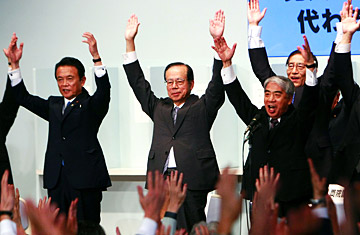
Yasuo Fukuda, center, and Taro Aso, left, participate in a traditional banzai cheer after Fukuda was elected president of Japan's ruling Liberal Democratic Party, Sunday, Sept. 23, 2007.
Even in the consensus-driven culture of the Japanese media, the national dailies' lockstep front-page declaration on Sunday morning — PRIME MINISTER FUKUDA TO BE ELECTED TODAY — was an example of just how predetermined the race to replace Prime Minster Shinzo Abe was. Yasuo Fukuda's formal victory over his rival Taro Aso as the president of the Liberal Democratic Party (LDP) and, effectively, Prime Minister later that day merely made official what the country had known since Fukuda first threw his hat in the race. The two candidates fought over 528 votes — 387 LDP parliamentarian votes and 141 votes from the LDP's prefectural chapters — with Fukuda winning 330, a landslide. The charismatic Aso hoped to win over the prefectural votes when it became clear that most his fellow Diet members were casting their ballots for Fukuda in keeping with their faction bosses' orders. Aso came away with 46% of the chapter votes, but not enough to change the course of the race.
But it wasn't always this way. Before Prime Minister Abe unexpectedly announced his resignation on Sept. 12, Aso, his outspoken party secretary general, was long considered the successor to Abe's conservative administration. However, the moment Abe's resignation hit the airwaves, the LDP's factional politics went into high gear — and within 24 hours, 71-year-old Fukuda, who only last year declined to run for Prime Minister due to his old age, was the indisputable front-runner in the two-man race.
After a full week of campaigning, there were few policy differences between the two candidates on many important issues, including the handling of over 50 million lost pension records, rural economic stagnation and tax reforms. Abe's failure to address these problems cost his party control of Japan's upper house, and yet, like their fallen predecessor, both Fukuda and Aso preferred to highlight their foreign policy differences — Fukuda called for open talks with Japan's neighbors, while the hawkish Aso took a conservative stance on the Yasukuni war shrine, a sore point in Asian relations. Both favored postponing a general election until next spring; both have also inherited Abe's insistence on continuing Japan's support of coalition forces in Afghanistan through its refueling operations in the Indian Ocean.
So how did a race between such similar candidates end with such a lopsided result? What divided the two, essentially, was their position within the LDP. The party was clearly desperate to distance itself from a disastrous leader widely blamed for allowing the LDP's ruling coalition to lose control of the upper house of parliament in July. Abe, who on Saturday cast his absentee ballot from the Tokyo hospital bed that he has been confined to since his resignation speech, sent a message to be read after the election: "I apologize to party general secretary [Aso] and all LDP lawmakers, party members and especially the Japanese public for causing a political vacuum." Aso's closeness to Abe, most analysts say, is what cost him his third bid for prime minister. The party instead looked to Fukuda, the long-serving speaker of Junichiro Koizumi's colorful cabinet and a skilled consensus builder, to rebuild and regain voters' confidence.
Aso's campaign pegged the election as a battle between the old and the new LDP; the party decided that a return to the old faction-driven politics of compromise was what it needed. Whether the old ways can provide solutions to Japan's problems, though, remains to be seen; with Fukuda still unclear on how he intends to solve Japan's domestic economic issues, the LDP has until next spring's general elections to prove it can answer to the country's needs.
